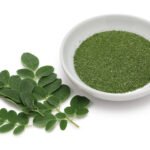 26 August 2025
26 August 2025The Link Between Herbal Nutrition and Mental Health
In today’s fast-paced world, mental health has become one of the most important pillars of overall well-being. Anxiety, stress, burnout, and sleep disorders are increasingly common—even among young adults. While therapy, mindfulness, and modern medicine play vital roles in addressing mental health challenges, an often-overlooked factor is nutrition, especially herbal nutrition. For centuries, natural herbs have been used in traditional systems like Ayurveda to restore balance in the body and mind. Modern science is now catching up with this wisdom, highlighting how plant-based remedies can support mental wellness in safe and sustainable ways.
Understanding the Mind-Body Connection
Our brain is not isolated from the rest of our body. What we eat directly affects our brain chemistry, hormonal balance, gut health, and overall mood. In fact, around 90% of the body’s serotonin—a chemical responsible for mood regulation—is produced in the gut. This strong connection between the gut and the brain, known as the gut-brain axis, proves that food is more than fuel—it’s information for the mind.
When the body lacks essential nutrients or is constantly inflamed due to poor dietary choices, it often manifests in the form of mood swings, fatigue, depression, or anxiety. This is where herbs come in—offering natural ways to nourish both body and mind.
How Herbal Nutrition Helps Mental Health
Herbal nutrition works in harmony with your body’s internal systems. Unlike synthetic drugs that often target just one symptom or chemical, herbs offer a holistic approach—supporting not only the brain but also hormonal, digestive, and immune functions, all of which influence mental health.
1. Stress and Anxiety Relief
Certain adaptogenic herbs like Ashwagandha and Tulsi (Holy Basil) are known to help the body adapt to stress. They regulate cortisol levels, the body’s primary stress hormone, and promote calmness without sedating the mind.
Ashwagandha, in particular, is known to:
- Lower cortisol and reduce anxiety symptoms
- Improve sleep quality
- Support adrenal health, which often suffers under chronic stress
2. Better Sleep Quality
Herbs like Chamomile, Brahmi, and Ashwagandha can aid in relaxing the nervous system and improving sleep cycles. A good night’s rest is essential for emotional regulation, memory, and mood stability.
3. Boosting Cognitive Function
Herbs such as Brahmi (Bacopa Monnieri) and Gotu Kola are traditionally used to enhance focus, concentration, and memory. They’re especially helpful for students or professionals dealing with mental fatigue.
These herbs help by:
- Supporting neurotransmitter function
- Improving blood circulation to the brain
- Reducing oxidative stress on brain cells
4. Balancing Mood Naturally
Herbs like Shankhpushpi, Jatamansi, and Licorice root have calming effects and can help balance mood swings and symptoms of depression. These herbs often work by regulating dopamine and serotonin—key chemicals involved in mood and pleasure.
The Role of Antioxidants and Anti-Inflammatory Compounds
Many herbs are packed with antioxidants and anti-inflammatory compounds that protect brain cells from oxidative damage—a key contributor to mental decline and mood disorders. For instance, Moringa, a powerful green herb, is rich in antioxidants, iron, and essential amino acids that support brain health and reduce inflammation.
Chronic inflammation in the body, often caused by processed foods and toxins, has been linked to anxiety and depression. By regularly consuming herbs that fight inflammation, you’re actively reducing your risk of mental health issues.
A Gut-Healthy Diet Supports a Healthy Mind
As mentioned earlier, gut health and mental health are deeply connected. Herbs like Triphala, Fennel seeds, and Aloe vera improve digestion, reduce bloating, and support a healthy microbiome, which in turn boosts mood and clarity of thought.
If you’ve ever felt foggy or irritable after a heavy, unhealthy meal, you’ve experienced this mind-gut connection firsthand.
Practical Ways to Add Herbal Nutrition into Your Daily Life
Incorporating herbal nutrition into your routine doesn’t require a drastic lifestyle change. Start small, be consistent, and choose quality, chemical-free herbs. Here are a few simple ways:
- Add Ashwagandha powder to your milk or herbal tea before bed.
- Mix Moringa powder into your morning smoothies or sprinkle on salads.
- Sip on Tulsi tea during stressful workdays for calm and clarity.
- Take a teaspoon of Triphala with warm water at night to support digestion and detox.
Choose Purity and Transparency
When choosing herbs, purity matters. Many over-the-counter supplements are mixed with fillers or processed in ways that reduce their effectiveness. At Sukhi Farm, we offer pure, chemical-free, and traditionally processed herbs that retain their natural potency and flavor. Whether you choose Ashwagandha for stress, Moringa for energy, or a combination of both, our herbs are designed to help your body and mind function at their best.
Conclusion: Nature’s Answer to Modern Stress
Mental wellness is not just about medication or therapy. It’s about creating a lifestyle that supports peace of mind, clarity of thought, and emotional balance. Herbal nutrition offers a powerful yet gentle path toward mental well-being—free from harmful chemicals and in sync with nature. As you care for your mind, consider going back to the roots—literally—with herbs that have stood the test of time.





